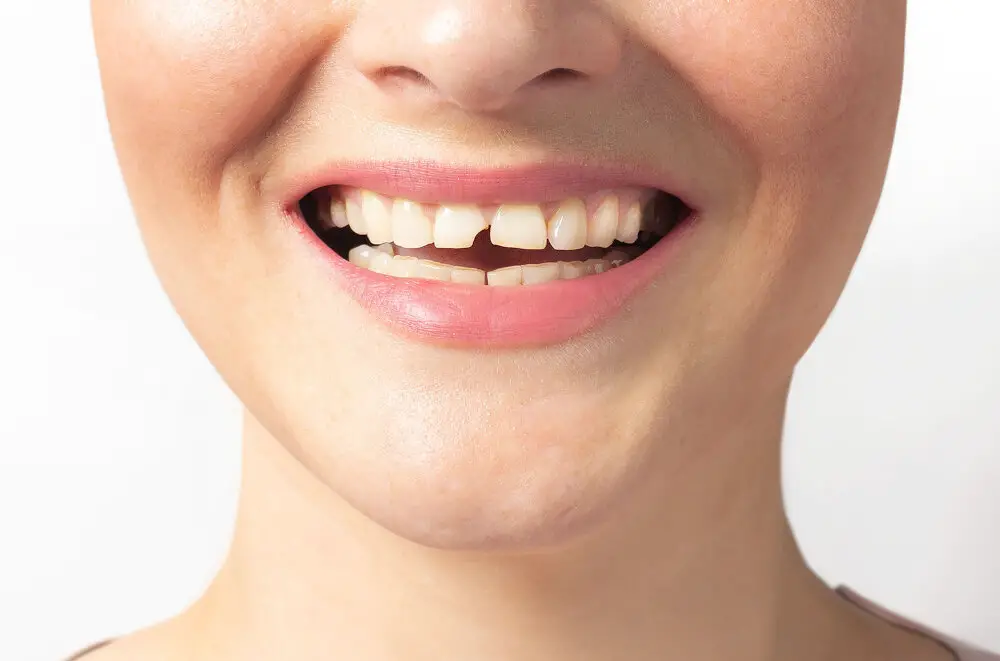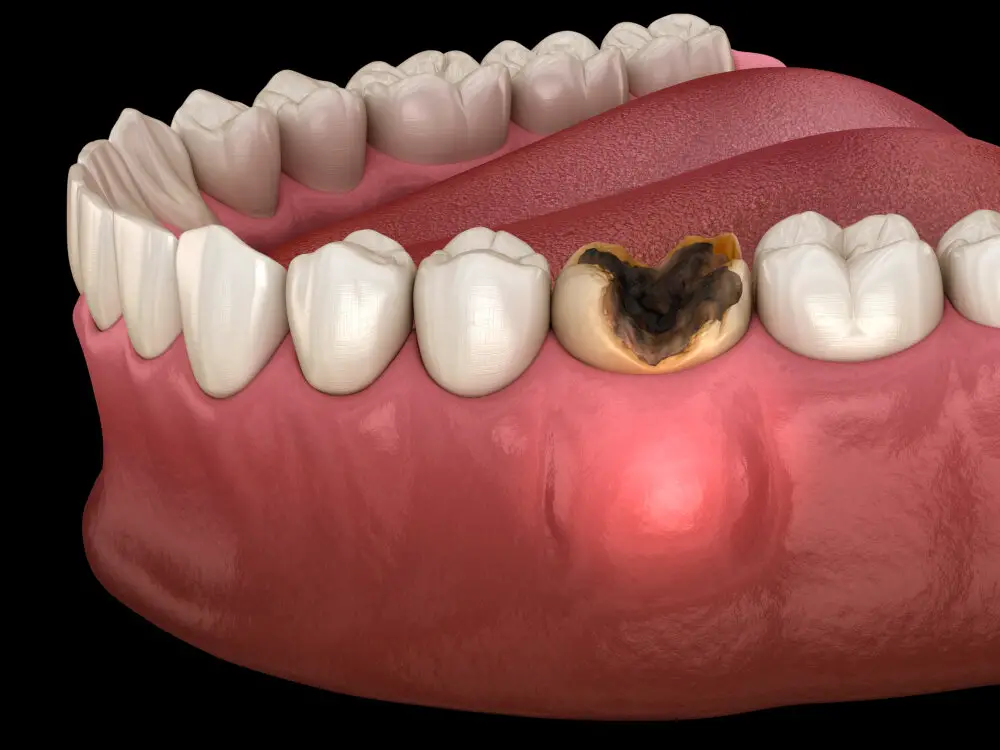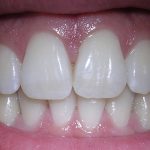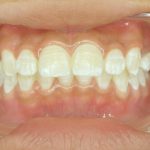Why Are My Teeth So Small? Understanding Dental Genetics and Possible Solutions

Have you ever wondered why your teeth are smaller than others? Do you feel self-conscious about your smile due to your small teeth? If so, you are not alone. Many people have teeth that are smaller than average, and it can be a source of insecurity and embarrassment. The size of your teeth is determined by a combination of genetics, lifestyle factors, and dental health. In this article, we will explore the genetic factors that can cause small teeth and provide possible solutions to help you achieve a beautiful, confident smile. Dental genetics is a complex field that involves the study of genes and their impact on dental health. Scientists have identified several genes that play a role in tooth development, including those that determine the size, shape, and structure of your teeth. These genes can be inherited from your parents, which means that if they have small teeth, you are more likely to have them too. However, genetics is not the only factor that influences tooth size. Other factors such as diet, oral hygiene, and dental health can also impact the size of your teeth. Understanding the underlying causes of small teeth can help you find the right solution for your unique needs.
One of the most common dental issues people face is having small teeth. This condition can be caused by a variety of factors, including genetics and poor dental hygiene. Many people who have small teeth may also suffer from other dental problems, such as overcrowding, gaps between teeth or bite issues. Small teeth can have a significant impact on a person’s self-esteem and confidence, leading to social anxiety and other mental health issues. Fortunately, there are several cosmetic dental treatments available to help people with small teeth, including veneers and bonding, to improve the appearance of their teeth and boost their self-esteem. Understanding the root cause of small teeth is crucial to determine the best treatment options and prevent any further dental issues.
Dental genetics plays a crucial role in determining tooth size, and understanding this relationship is important for diagnosing and treating dental anomalies. Tooth size is a complex trait that is influenced by multiple genes, as well as environmental factors. The size and shape of teeth can affect not only a person’s smile but also their bite, speech, and overall oral health. By analyzing a patient’s dental genetics, dentists and orthodontists can better predict and plan for tooth size discrepancies, and develop personalized treatment plans that take into account the individual’s unique genetic makeup. Advances in dental genetics research and technology are opening up new possibilities for more precise and effective dental treatments.
What Causes Small Teeth?

Small teeth can be caused by various factors, both genetic and environmental. One of the main genetic factors that can lead to small teeth is a condition called microdontia. This condition causes teeth to be smaller than average and may affect a few teeth or the entire dentition. Microdontia can be inherited from one or both parents, and it is more common in certain populations, such as people with Down syndrome. In addition, some genetic disorders, such as ectodermal dysplasia and amelogenesis imperfecta, can also lead to small teeth due to abnormal development of the teeth. Environmental factors can also contribute to small teeth. Poor nutrition during childhood, particularly a lack of calcium and vitamin D, can lead to delayed or abnormal tooth development, resulting in smaller teeth. Additionally, certain medications, such as tetracycline antibiotics, taken during tooth development can cause discoloration and small teeth. Trauma to the teeth, such as from injury or bruxism (tooth grinding), can also cause enamel to wear down, making the teeth appear smaller. It is important to identify the underlying cause of small teeth in order to determine the appropriate treatment options.
Genetic factors play a crucial role in determining the size and shape of our teeth. The genes inherited from our parents can affect the development of our teeth during childhood, and can also impact the overall structure and alignment of our dental arches. For example, variations in the genes responsible for tooth enamel formation can lead to weaker or thinner enamel, which may increase the risk of tooth decay or damage. Additionally, certain genetic conditions such as amelogenesis imperfecta or dentinogenesis imperfecta can cause significant abnormalities in tooth size and shape. While genetic factors cannot be changed, there are various dental treatments available to address cosmetic or functional concerns related to tooth size and shape.
Environmental factors can play a significant role in the development of dental genetics. Poor nutrition, lack of proper dental care, and certain medications can all contribute to smaller teeth. For example, a diet low in calcium and vitamin D can inhibit proper tooth growth, while excessive consumption of sugary or acidic foods can lead to enamel erosion and tooth decay. Additionally, environmental factors such as fluoride in drinking water and regular dental cleanings can help prevent and treat dental issues. While genetics play a significant role in dental health, understanding and addressing environmental factors can help maintain and improve oral health.
Medical conditions can have a significant impact on dental development and genetics. For instance, individuals with conditions such as amelogenesis imperfecta and dentinogenesis imperfecta may experience small teeth due to abnormal enamel or dentin formation. Additionally, hormonal imbalances during developmental stages can lead to abnormally small teeth. It is important for individuals with medical conditions to work closely with their dental professionals to develop appropriate treatment plans that address their unique needs. This may include orthodontic interventions, restorative procedures, or other specialized treatments to help improve the appearance and function of their teeth.
Understanding Dental Genetics

Dental genetics is a fascinating field that studies how genes influence the development and structure of teeth. The size, shape, and position of teeth are determined by a complex interplay between genetic and environmental factors. Genetic mutations can lead to a variety of dental abnormalities such as small teeth, missing teeth, or misaligned teeth. Inherited conditions like amelogenesis imperfecta or dentinogenesis imperfecta can also affect the quality and strength of teeth. Understanding dental genetics can help dentists diagnose and treat these conditions more effectively. By analyzing a patient’s genetic profile, dentists can predict the risk of dental diseases and recommend preventive measures or early interventions. Small teeth are a common concern among dental patients, especially those with a family history of dental problems. Small teeth can cause functional and aesthetic problems, such as difficulty chewing, speech impairment, and low self-esteem. Understanding the genetic basis of small teeth can help dentists provide appropriate treatment options. For example, dental bonding or veneers can be used to increase the size of small teeth and improve their appearance. Orthodontic treatments like braces or Invisalign can also be used to correct misaligned teeth and improve the bite. In some cases, genetic testing may be recommended to determine the underlying cause of small teeth and develop personalized treatment plans. Overall, dental genetics plays a crucial role in improving the oral health and well-being of individuals with dental abnormalities.
Genes play a crucial role in determining tooth size. The size of our teeth is determined by a combination of genetic factors and environmental conditions. The genes that are responsible for tooth size can be influenced by factors such as diet, oral hygiene, and other lifestyle factors. Some genes may cause teeth to be smaller, while others may cause them to be larger. The size and shape of teeth are also influenced by the genes that control tooth development. Understanding the genetic factors that contribute to tooth size can help dentists and orthodontists develop personalized treatment plans for their patients. Additionally, advancements in dental genetics research may lead to the development of new treatments and interventions to improve dental health and prevent tooth decay.
Genetic variations play a crucial role in shaping our physical characteristics, including tooth size and shape. These variations can occur due to random mutations or inherited from our parents. Recent studies have identified several genes associated with dental development, such as PAX9 and MSX1. Mutations in these genes can lead to abnormalities in tooth size, shape, and number. Understanding the genetic basis of dental traits can help dentists diagnose and treat conditions such as malocclusion or hypodontia more effectively. Additionally, advances in genetic research may allow for personalized dental treatments that consider an individual’s unique genetic makeup.
Tooth size inheritance patterns are complex and involve multiple genes, making it difficult to predict the exact size of an individual’s teeth based on their parents. However, research has shown that tooth size tends to be inherited in a polygenic manner, meaning that multiple genes contribute to the size of an individual’s teeth. Additionally, environmental factors such as nutrition and oral hygiene can also influence tooth size. In some cases, genetic mutations may result in abnormally small teeth, a condition known as microdontia. While there is no guaranteed way to increase tooth size, orthodontic treatments such as braces and veneers can help improve the appearance of smaller teeth.
Possible Solutions for Small Teeth

Possible Solutions for Small Teeth:If you are unhappy with the size of your teeth, there are several options available to help improve your smile. One of the most popular methods is dental bonding, which involves applying a tooth-colored resin to the surface of your teeth to make them appear larger. This is a quick and painless procedure that can be completed in just one visit to your dentist. Another option is veneers, which are thin shells of porcelain or composite resin that are bonded to the front of your teeth to improve their appearance. Veneers can be customized to match the shape and size of your natural teeth, so they look completely natural. Both of these options are great for people with small teeth who want to improve the appearance of their smile. In some cases, orthodontic treatment may be necessary to correct small teeth. Braces or clear aligners can be used to move your teeth into the correct position and improve their size and shape. This option is ideal for people who have overlapping or crooked teeth, as well as those who have a small jaw or crowded teeth. Orthodontic treatment can take several months or even years to complete, but the results can be dramatic and long-lasting. Your dentist can help you determine which option is best for you based on your individual needs and goals.
Cosmetic dentistry offers a range of options for individuals seeking to enhance the appearance of their teeth. One of the most popular options is dental veneers, which are thin, custom-made shells that cover the front of teeth to improve their shape, size, and color. Another option is tooth bonding, which involves applying a tooth-colored resin material to the teeth to improve their appearance. Teeth whitening is also a popular cosmetic dentistry treatment, which involves using a bleaching agent to lighten the color of the teeth. Additionally, orthodontic treatments such as braces and clear aligners can be used to straighten crooked teeth and improve overall dental aesthetics. With the wide range of options available, individuals can work with their dentist to create a personalized treatment plan that meets their specific cosmetic goals.
Orthodontic treatments are procedures that aim to correct the alignment and positioning of teeth. These treatments can address a variety of dental issues, including overcrowding, spacing, and malocclusion. Orthodontic options include traditional metal braces, clear aligners, and lingual braces that attach to the back of the teeth. The type of orthodontic treatment that is best suited for an individual depends on the severity of their dental issue, their age, and their lifestyle. While orthodontic treatments can take time to complete, they can result in a beautiful, healthy smile that boosts self-confidence and improves overall oral health.
Jaw surgery is a common solution for individuals with dental genetics that result in a misaligned jaw or bite. This surgery can help to improve the overall appearance of the face and teeth, as well as improve functionality when eating and speaking. The procedure involves repositioning the jaw and may include the use of plates, screws, and wires to hold the jaw in its new position. Recovery time can vary but typically involves a liquid diet for several weeks and restricted physical activity. While the procedure can be invasive, it can greatly improve the quality of life for those with dental genetics that affect the jaw.
Dental implants are an excellent solution for those who have lost one or more teeth due to genetics or other factors. These implants are surgically placed into the jawbone and act as a replacement root for the missing tooth. Once the implant fuses with the bone, a dental crown is placed on top, providing a natural-looking and functional tooth. Dental implants are a long-lasting solution that can improve the appearance of your smile and restore your ability to chew and speak properly. They are also easy to care for and can last a lifetime with proper maintenance. If you have small or missing teeth due to genetics, dental implants may be the solution you’ve been looking for.
Prevention and Maintenance

Prevention and maintenance are key factors for maintaining the health of your teeth. Genetics play a significant role in the size and shape of your teeth, but proper dental hygiene can help prevent decay and other dental issues. Brushing and flossing regularly, along with regular check-ups with your dentist, can help maintain the health of your teeth and prevent any major problems from developing. It’s also important to avoid sugary and acidic foods and drinks, as they can erode your tooth enamel and lead to cavities. By taking care of your teeth through preventative measures, you can minimize the need for more extensive dental procedures in the future. In addition to prevention, maintenance is also key in keeping your teeth healthy. Regular cleanings from your dentist can remove any built-up plaque or tartar that can lead to decay or gum disease. If you do need more extensive dental work, such as fillings or root canals, it’s important to follow your dentist’s instructions for aftercare to ensure proper healing. In some cases, orthodontic treatment may be necessary to correct issues with the size or shape of your teeth. By staying on top of your dental health and seeking treatment as needed, you can maintain your beautiful smile for years to come.
Good oral hygiene is essential for maintaining healthy teeth and gums. Neglecting oral hygiene can lead to a buildup of plaque and bacteria, which can cause tooth decay, gum disease, and bad breath. Regular brushing and flossing help to remove plaque and prevent the buildup of harmful bacteria. Additionally, visiting a dentist regularly for checkups and cleanings can help to detect any potential problems early on and prevent them from becoming more serious. Taking care of your teeth and gums not only helps to maintain a healthy smile, but it also contributes to overall health and well-being.
Regular dental checkups are an essential part of maintaining good oral health, especially when it comes to understanding dental genetics and possible solutions for small teeth. These checkups allow your dentist to identify any potential issues early on, which can prevent more significant problems from developing in the future. Your dentist can also provide you with advice on how to best care for your teeth and gums, including tips on brushing and flossing techniques, dietary considerations, and the use of dental products like mouthwash and toothpaste. By scheduling regular checkups and following your dentist’s recommendations, you can help ensure that your teeth stay healthy and strong for years to come.
Lifestyle changes play a crucial role in maintaining healthy teeth. Firstly, it is important to brush your teeth twice a day for at least two minutes each time with fluoride toothpaste. Secondly, flossing daily helps to remove plaque and food particles from between teeth, which brushing alone cannot reach. Additionally, reducing the intake of sugary and acidic foods and drinks can also help to prevent tooth decay. A balanced diet including calcium-rich foods like milk, cheese, and yogurt can help to strengthen teeth. Finally, quitting smoking and limiting alcohol consumption can also improve oral health and reduce the risk of gum disease and oral cancer. Incorporating these lifestyle changes can help to promote good dental hygiene and keep your teeth healthy and strong.
In the article \Why Are My Teeth So Small: Understanding Dental Genetics and Possible Solutions\, key points were discussed about the genetic factors that can affect the size and shape of our teeth. The article highlighted how genetics play a significant role in the development of our teeth and how variations in genes can lead to smaller than average teeth. Additionally, possible solutions for those with small teeth were explored, including orthodontic treatments and cosmetic dentistry procedures. Overall, the article emphasized the importance of understanding dental genetics and seeking professional advice to address any concerns about tooth size and shape.
Understanding dental genetics is crucial in addressing dental issues as it provides valuable insights into the underlying genetic factors that contribute to dental problems. Dental traits such as the size, shape, and alignment of teeth are largely determined by genetic factors, and variations in these genes can result in a range of dental issues. By identifying these genetic variations, dental professionals can develop personalized treatment plans that address the root cause of the problem and provide more effective and long-lasting solutions. Furthermore, understanding dental genetics can also help individuals to make informed decisions about their oral health and take steps to prevent dental issues before they arise. Overall, a deeper understanding of dental genetics is essential for improving dental health outcomes and ensuring better oral health for generations to come.
If you are concerned about the size of your teeth, seeking professional advice and treatment is essential. Small teeth can not only affect the appearance of your smile, but they can also impact your oral health. A qualified dentist can assess your dental genetics and provide personalized solutions to help you achieve a healthy and aesthetically pleasing smile. Don’t let the size of your teeth hold you back from feeling confident and comfortable. With the help of a dental professional, you can address any concerns and take steps towards improving your oral health and overall well-being.
Conclusion

In conclusion, dental genetics plays a significant role in determining the size of your teeth. While some people are blessed with naturally larger teeth, others may have smaller ones due to genetic factors. However, there are several possible solutions to address this issue, such as dental veneers, bonding, or crowns. It is essential to consult with a dental professional to determine the best course of action. Ultimately, the size of your teeth should not be a source of insecurity or shame. Embrace your unique smile and take steps to maintain good oral health for a lifetime of confident smiles.







